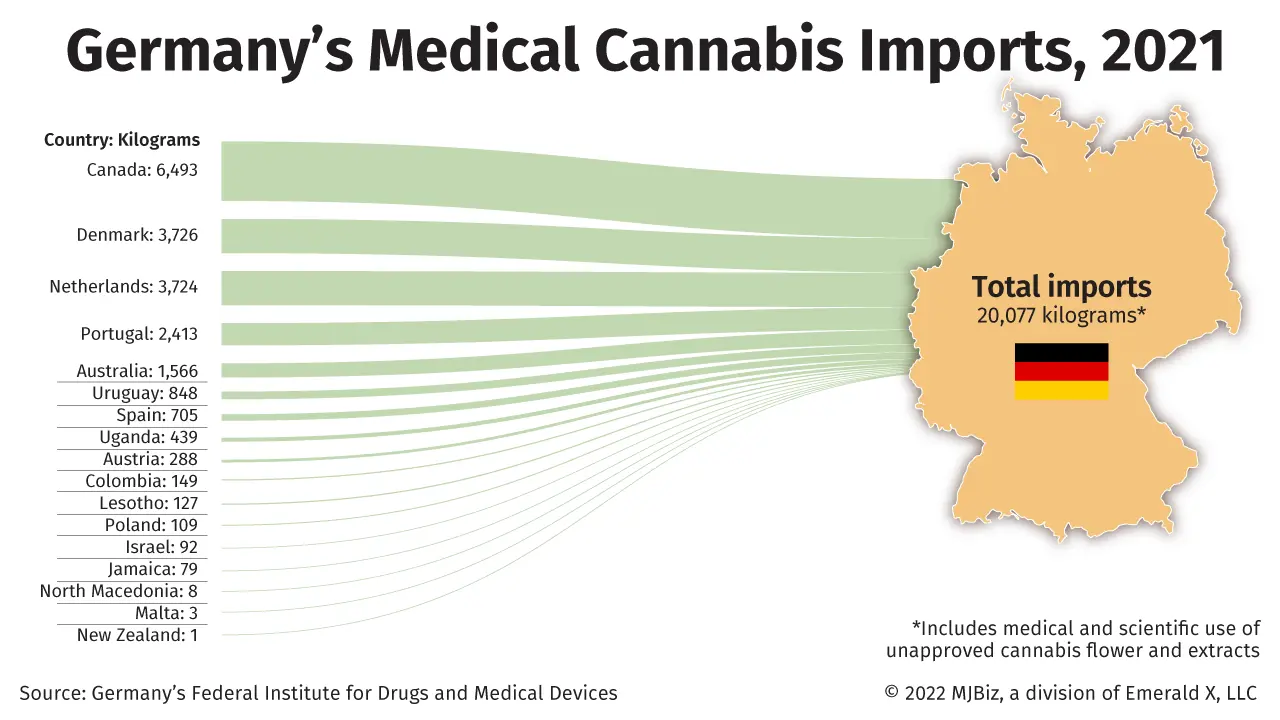Business
German cannabis imports growing as Canada’s leading share wanes

Germany imported a record amount of cannabis for medical sales and scientific use in the first half of this year, putting the European Union’s biggest market on pace to match or possibly surpass 2021’s total.
The data paints a picture of a medical market that is growing consistently, though not at the blistering pace some analysts had forecast amid the cannabis stock market mania of 2018-20.
Separate data also shows Canada’s role as the country’s top supplier has waned as competition to supply the prized, if still small, German market intensifies.
Cannabis companies in Denmark, the Netherlands and Portugal also supply the German market.
Imports of dried flower and extracts through the first six months of 2022 equaled 10,487 kilograms (11.6 tons), which is 6.1% higher than the first half of last year, when 9,840 kilograms were imported, according to the data from the Federal Institute for Drugs and Medical Devices (BfArM).
Dried cannabis is accounted for as a weight in kilograms, while extracts weight is calculated as the amount of dried flower used for the production of the imported extracts.
In all of 2021, Germany imported 20,589 kilograms of cannabis for medical and scientific purposes, a substantial increase over its 13,346 kilograms in 2020.
Germany imported roughly 8,057 kilograms of cannabis in 2019.
Experts say an unknown quantity of the imported product is reexported to other Europe Union countries, so the import figure should not be used to measure Germany’s market size.

Canada being challenged
Canada remained Germany’s top supplier in 2021, separate German government data shows.
Last year, Canadian licensed producers shipped 6,493 kilograms of medical cannabis flower and extracts to Germany, accounting for approximately one-third of the country’s imports.
However, that percentage is falling.
Canada has accounted for upward of 38% of all of Germany’s medical cannabis imports since 2017, according to a report by Der Spiegel newspaper, citing government data.
The data suggests that although Canada maintains its leadership position as the No. 1 exporter to Germany, it’s being increasingly challenged by other countries, Alfredo Pascual, vice president of investment analysis at Seed Innovations, told MJBizDaily.
After Canada, the top suppliers to Germany in 2021 were Denmark (3,726 kilograms, or 18.1%), Netherlands (3,724 kilograms, or 18%) and Portugal (2,413 kilograms, or 11.7%).
Another reason for Canada’s diminishing role in Germany’s import mix might stem from some Canadian companies shifting production from their facilities s to Europe.
Edmonton, Alberta-based Aurora Cannabis had been supplying the German market primarily from Canada.
But the receipt of European Union-Good Manufacturing Practice (GMP) certification for its Aurora Nordic facility in Denmark on Sept. 11, 2020, allowed the company “to transition the supply of product destined for the EU markets from Canadian facilities to Nordic,” according to a regulatory filing.
A spokesperson confirmed that the majority of Aurora’s marijuana in Germany is now imported from Denmark.
Aurora shipped medical cannabis from Denmark to Germany for the first time in early 2021.
Aurora also holds one of the three licenses for medical cannabis production in Germany, and its EU-GMP-certified facility there, called Aurora Leuna, opened in July, meaning a limited amount of German demand will be met by Aurora’s facility there.
“With our experienced team, Aurora is well-positioned for future growth in the German market, and to capture opportunities in recreational markets in Europe, pending legalization,” the Aurora spokesperson said.
Axel Gille, president of Aurora Europe, said the company is a leading supplier of in Germany, “with the No. 2 position in medical flower sales and two of the top three bestselling dried-flower products.”
Growth impressive, not exponential
Businesses eyeing the German import market are warned against buying into any forecasts of exponential growth.
The German government data shows that imports dropped meaningfully in the final quarter in three of the past five years.
“While that may sound disappointing to those who were expecting unstoppable exponential growth, it’s still impressive to see that a market that started with less than two metric tons of imports in 2017 grew to over 20 tons imported in 2021,” Pascual said.
Pablo Zuanic, an analyst with New York-based investment banking firm Cantor Fitzgerald, estimates the German medical market will reach 300 million euros ($301 million) by the end of this year.
However, Germany does not publish reliable figures on legal cannabis sales, unlike Canada, leaving analysts and researchers to piece together bits of data.
The analyst also noted that past predictions have been well off the mark, citing a 2018 report by London-based Prohibition Partners that had projected a 1 billion-euro ($1.1 billion) medical market in Germany by 2020 and a forecast by Colorado-based BDS Analytics of an 800 million-euro market by 2022.
Zuanic’s report noted the German market “remains rather undeveloped” and has room for growth.
“What is the outlook for the German medical market? We think the out-of-pocket segment may migrate to the rec market, while the reimbursed (from health insurance) segment could continue to grow despite rec legalization,” according to the report.
Zuanic calculated Germany’s medical flower market to be running at 13 tons annually at an average price of 13 euros per gram overall, or 16 euros per gram for the reimbursed segment and 10 euros per gram for the out-of-pocket segment.
The extracts segment is estimated to be worth 80 million euros; the dronabinol segment is flat to declining, at 20 million euros.
Germany’s plan to legalize recreational cannabis is expected to have an unknown impact on the medical market.
Zuanic’s report asks: “Are we putting too much attention on Germany, a market that we estimate has, at best, 300 million euros in medical cannabis sales at present?”
The answer, according to the report, “will come down to the structure of the future German rec cannabis market, which will determine its size and profitability.”
Source: https://mjbizdaily.com/german-cannabis-imports-growing-as-canadas-leading-share-wanes/